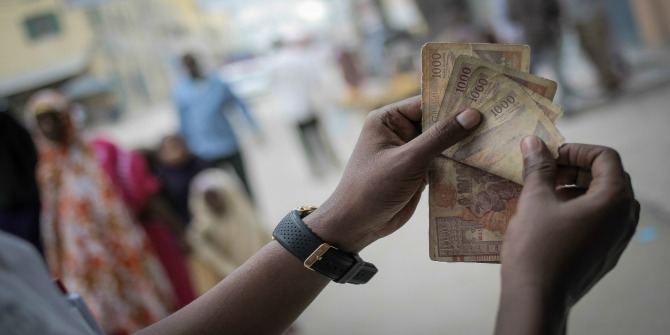LSE’s Portia Roelofs explores the challenges facing roadside traders as Ibadan seeks to transform itself into a modern city.
Development equals modernisation. At least, according to the current Governor of Oyo State, Nigeria, it does. Elected, and then re-elected, on a platform of transforming the state, Abiola Ajimobi’s political posters show freshly tarred highways, and soaring flyovers. The plan is that by making Ibadan a modern city, it will attract modern investors. It’s not hard to see why they are frantic for alternative sources of funding: with falling global oil prices, petro-states like Nigeria have seen their revenue plummet since 2014¹.
However, this opens a debate about what a modern city should look like, and who is included. Looking again at Ajimobi’s posters, there is something rather disquieting about the roads portrayed: they are entirely empty. Freshly painted tarmac runs through uninhabited, depopulated streets. A strange idea in a country with one of the world’s fasting growing populations.
The photos allude to a concrete goal of Ajimobi’s urban renewal programme: the removal of traders from the roadside. He has called roadside traders an ‘eye-sore’.
This was the most contentious issue of the 2015 election, with Teslim Folarin, the PDP’s candidate, characterising the governor as cleaning out a chicken coop by killing all the chickens. Ajimobi insisted that he had provided for traders by giving them free stalls at new ‘ultra-modern’ markets. Many traders complain that the new markets are ‘not moving’, and have returned to the roadside to make ends meet.
In my PhD research I explore the way that traders think about the move, and whether they think it reflects their own ideas of ‘good governance’. I explored the lived reality of some of the traders; from demolition of their stalls, to relocation to a newly built market, and –for some of them – the risky journey back to the roadside.
Through these photos I sought to capture the worlds of these traders from just their workspaces. A sheet of newspaper spread across a bench creates a watch repair station, smaller than an A4 page. Among my interviewees were mobile phone engineers, a nail beautician, a wristwatch repairer, cobbler and a photographer.
It is important not to romanticise roadside trading. My interviewees complained about the dangers of having children with them, and the difficulties of finding places to store their stock. Many had fallen back on trading when more lucrative or secure employment had fallen through, and were involved in petty trading as a survival strategy to “manage” from day to day.
One lady sat under a bridge, 70 small bottles of nail varnish arranged neatly on a showcase in front of her. She lamented the demolition of her previous shop, where she used to sell a much bigger range of beauty products. She now lacked the capital to expand her stock to more lucrative products, and said she had not got over the stress of losing her business.
The response from government to criticism has been mixed. Unofficially, the agencies involved stopped clearing people from mid-2014, in an unspoken but widely understood electoral ploy². Officially, the governor stood by the demolitions, insisting that development required sacrifices. Whether the sacrifices are pain for poor and gain for the middle classes and investors remains to be seen.
Work is due to start soon on the Ibadan Urban Flood management Project, an even more ambitious urban planning scheme. Funded by $200m of World Bank money, will it learn the lessons of the last four years?
Portia Roelofs is a researcher in LSE’s Department of International Development.
¹The Oyo State government receives a monthly Federal Allocation from the the Federal Government, making up the bulk of its budget. Since October 2014 allocations have fallen to between 60% and 75% of 2011 levels. http://www.ngrguardiannews.com/2015/10/how-edo-and-oyo-states-tackle-dwindling-revenue/
²When I left Ibadan in August 2015 there had not been any sustained moves from the government to start clearing traders again, but it was anticipated that clearing would restart now the Governor had been inaugurated.
The views expressed in this post are those of the author and in no way reflect those of the Africa at LSE blog or the London School of Economics and Political Science.












